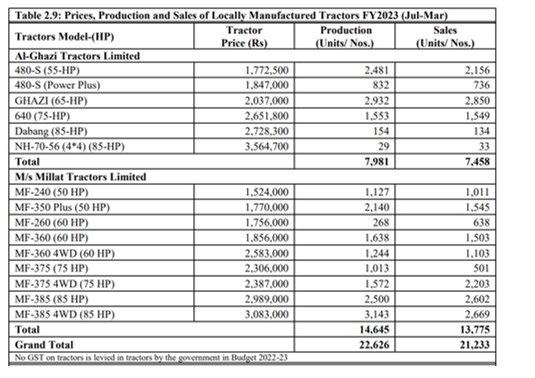INP-WealthPk
Arooj Zulfiqar
Tax breaks on agricultural machinery imports will boost the productivity of Pakistan's agriculture sector by reducing financial barriers and incentivising advanced technology adoption, said an official. “This empowers farmers, promotes food security, and supports sustainable practices, thus unlocking the sector’s potential for a prosperous future,” said Muzammil Hussain, Scientific Officer at National Agriculture Research Centre (NARC), while talking to WealthPK.
“Domestic industry has limited capacity to produce agricultural machinery and equipment, accounting for 15% of the country's total requirements. Production is expected to remain limited over the coming four years due to factors like raw material availability, limited project financing, and lack of research and development (R&D) facilities,” he said. “Most of the locally produced machinery is based on outdated technology and its efficiency is substantially low.
A wide variety of more sophisticated equipment is imported, but local farmers prefer replacement and spare parts manufactured locally due to relatively low cost,” he said. “Tractors, combine harvesters, irrigation equipment, and other advanced machinery can revolutionise the way farmers operate, enabling them to save time, reduce labour costs, and increase their output,” he said.
However, he said, the high cost associated with purchasing such machinery acts as a major barrier for Pakistani farmers, many of whom struggle with limited financial resources. “Tax breaks on agricultural machinery imports by the government will address this financial hurdle and encourage the adoption of advanced technology. These tax incentives would reduce burden on farmers, making modern machinery more affordable and accessible,” Muzammil said.
He said modern machinery enables precise and targeted farming practices such as accurate seeding, fertilisation, and irrigation, resulting in optimised crop growth and higher yields. This, in turn, would enable Pakistan to meet the rising food demand of its growing population and reduce its reliance on food imports, thus enhancing food security and self-sufficiency.
According to local industry sources, the total land area under cultivation during the fiscal year 2021-22 was approximately 48 million hectares, which decreased around 2% compared to the previous year. According to government estimates, the total size of the agricultural machinery sector is approximately $1 billion, consisting of a combination of tractors, harvesters, irrigation equipment, and other small-scale agricultural machinery.
Industry experts believe that a considerable gap exists in the per-acre availability of tractors and other agricultural machinery in Pakistan. Approximately 692,626 tractor units were operational in the country during the July-March period of the fiscal year 2022-23, resulting in the availability of approximately 0.9 horsepower (HP) per acre against the required power of 1.4 HP per acre. Pakistan’s total tractor production stood at 22,626 during the period under review compared to 41,872 produced over the same period of 2021-22, showing a decrease of 46%.

Credit: INP-WealthPk



